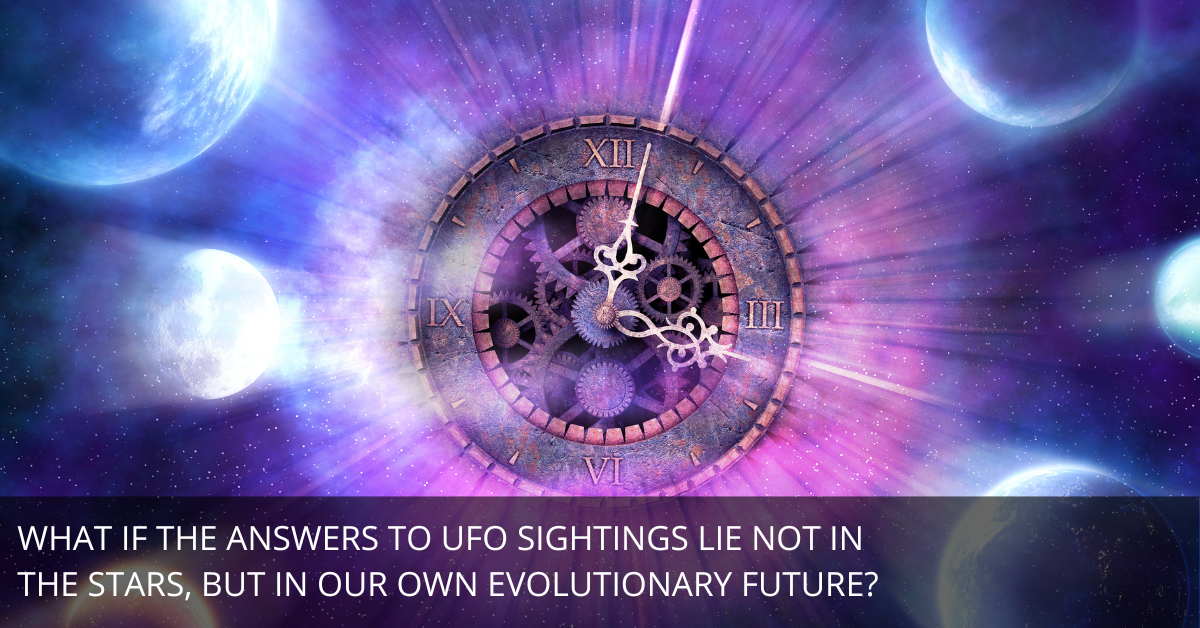
What if those mysterious flying objects darting across the sky aren't piloted by extraterrestrials? What if, instead, they're flown by time-traveling humans from our evolutionary future?
Yes, it's wild. But the "Future Human Hypothesis" is gaining traction, and it could fundamentally change the way we think about UFOs—and ourselves.
Let's break this idea down, see what makes it tick, and, more importantly, show you how to explore this fascinating theory.
What Is the Future Human Hypothesis?
The basic idea is simple: UFOs might not be "unidentified flying objects" from distant planets, but advanced vehicles created by humans who live thousands—or even hundreds of thousands—of years in the future.
These future humans could be visiting us for three main reasons:
- Curiosity – Think of it as historical tourism. Instead of going on a Caribbean cruise, future humans might take a time-traveling detour to watch dinosaurs roam, see the pyramids built, or study us in the 21st century.
- Saving Humanity – Maybe they're trying to stop us from doing something catastrophic, like triggering a nuclear war. After all, there's a strong link between UFO sightings and nuclear facilities.
- Survival – Evolutionary trends suggest that human DNA is becoming more homogenized. Future humans might need our ancient genetic diversity to prevent extinction.
It's speculative, sure. But as far as theories go, this one has some teeth.
Why This Theory Is (Weirdly) Plausible
Michael Masters, a professor of biological anthropology, literally wrote the book on this: Identified Flying Objects: A Multidisciplinary Scientific Approach to the UFO Phenomenon. He argues that this hypothesis avoids the "alien problem" entirely. We don't need to figure out how life evolved on distant planets or how interstellar travel works. We just need to assume that human evolution continues—and that we eventually crack the time travel code.
And let's not forget Ross Coulthardt, a hard-nosed journalist who claims insiders in the U.S. government have floated the same idea: UFOs aren't aliens but humans.
Still skeptical? That's fair. Time travel itself is a tough nut to crack.
The Science of Time Travel (and Its Challenges)
Here's the deal: Traveling forward in time is possible—and even happens in small ways today. Thanks to Einstein's theory of relativity, astronauts on the International Space Station technically experience time slightly more slowly than we do on Earth. Over a day, it's just a few microseconds, but the principle holds.
Traveling backward, though? That's where things get dicey. Physicists say it might violate the Second Law of Thermodynamics. In plain English, time seems to flow in one direction because the universe is constantly moving from order to disorder. Think of a cake: you can mix flour, sugar, and eggs into a batter, but you can't unmix it once it's baked.
And don't even get started on the Grandfather Paradox—kill your granddad in the past, and how are you even alive to do it?
So yeah, backward time travel isn't just a science problem. It's a logic puzzle that breaks brains.
What Future Humans Might Look Like
If this theory holds water, UFO sightings might give us a glimpse of what humans could look like in the distant future:
- Bigger Brains, Bigger Eyes – These are common descriptions in close-encounter accounts, and they make sense. Larger brains suggest higher intelligence, and bigger eyes could be adaptations for seeing in low-light conditions—say, on a colonized Mars.
- Less Physical Diversity – As humanity intermixes globally, genetic traits such as blue eyes or red hair might disappear. Future humans could be more uniform, with dominant traits prevailing.
Picture this: a bipedal, hairless being with a massive head and enormous eyes. It's unsettling, but it might just be our great-great-great-grandkids.
How to Dive Deeper Into This Fascinating Idea
This theory is more than just a fun thought experiment. It opens up a world of questions about evolution, ethics, and the nature of time itself. If you're ready to geek out, here's what to do next:
1. Start With the Right Books
Dive into Michael Masters' Identified Flying Objects. It's the cornerstone text for understanding the Future Human Hypothesis. Pair it with Ross Coulthardt's In Plain Sight to get a journalistic perspective on UFO phenomena.
For added depth, consider reading about human evolution and time travel in books such as Sapiens by Yuval Noah Harari or Black Holes and Time Warps by Kip Thorne.
2. Understand the Science of Time Travel
You don't need to become a physicist, but wrapping your head around the basics will help. Here's how:
- Watch Neil deGrasse Tyson's videos on time dilation. He explains why time moves more slowly the faster you go.
- Research the Second Law of Thermodynamics. Start with examples like why ink disperses in water but never re-coalesces.
- Explore time travel paradoxes. Can you really kill your own grandfather? Probably not, but the implications are fascinating.
- Consider Block Universe Theory. This idea suggests all moments in time exist simultaneously, like a four-dimensional "block" of spacetime, aligning with Einstein's relativity and reshaping how we think about time travel.
3. Stay Curious About Human Evolution
Our future depends on what happens to us physically and genetically. To understand this better:
- Read about current trends in genetics. For example, dominant traits like brown eyes are becoming more common due to global intermixing.
- Explore speculative research on what humans might look like in 100,000 years. Start with Nickolay Lamm's illustrations, which show larger foreheads and eyes as potential adaptations.
4. Reflect on the Ethics of Time Travel
This one's a bit more abstract but no less important. If future humans are meddling with our timeline, what are the moral implications?
- Would you stop a disaster if it meant erasing millions of lives that wouldn't have existed otherwise?
- Should future humans have the right to alter their past?
These aren't just hypothetical questions. They force us to think about our responsibilities—to ourselves and to future generations.
Why This Matters
Whether or not you buy the Future Human Hypothesis, it's worth considering what it says about us today. Are we so caught up in the here and now that we can't imagine the long-term consequences of our actions? If future humans are real, their presence might be a warning: the choices we make now ripple forward in ways we can't predict.
So, next time you see a UFO story in the news, don't dismiss it. Instead, let it inspire you to think bigger. Read, question, and stay curious.
After all, the truth might not be out there. It might be right here, waiting for us to discover it.
And who knows? Maybe one day, a distant descendant of yours will hop into their time machine and pay you a visit. Just don't be surprised if they've got enormous eyes and ask for a DNA sample.
Explore other UFO hypotheses on the blog:

